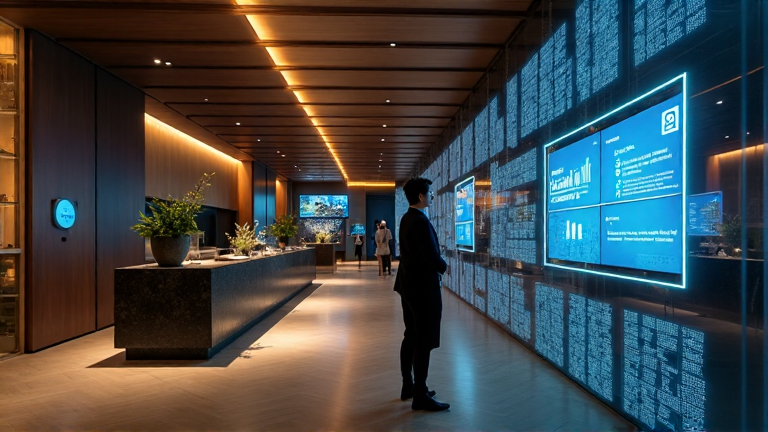
Concluding Thoughts: A Pragmatic Approach to AI Adoption in Hospitality
In the final analysis, AI is both a challenge and an opportunity for the hospitality industry. While it is not a miraculous game-changer, those who invest in robust technology, effective data management, and comprehensive staff training stand to reap significant benefits in guest personalization, operational efficiency, and revenue growth.
A Look at AI Today in Hospitality
Modern AI in the hospitality sector is defined by the use of narrow AI, which powers a range of tools from dynamic room pricing and targeted marketing to personalized service recommendations. While the concept of general AI—systems capable of human-like reasoning—remains largely theoretical, narrow AI is very much in practice, analyzing massive datasets that include booking histories, guest preferences, and seasonal trends.
Hotels utilize these sophisticated algorithms to cater to each guest’s unique tastes, offering premium room enhancements, exclusive spa treatments, and even chef-curated culinary experiences. However, the reliance on extensive guest data raises critical questions regarding privacy, security, and regulatory compliance, underscoring the need for transparent data management practices.
From Hype to Reality: Navigating AI's Journey
The excitement around AI is fueled by success stories from industries such as e-commerce and retail. By emulating the efficiency and personalization seen in platforms like Amazon and Netflix, hotels are increasingly drawn to AI as a means to elevate guest experiences and drive loyalty. Innovations such as generative AI (GenAI) have broadened the horizon by enabling the creation of curated travel itineraries, generating text and images effortlessly, and paving the way for agentic AI platforms that promise autonomous guest journey management.
The industry is seeing a varied landscape in AI adoption:
- Macro-Level Adoption: Large hotel chains are investing heavily in comprehensive data infrastructure. These brands deploy AI to analyze bookings and occupancy patterns across multiple properties in real time.
- Micro-Level Adoption: Smaller independent hotels are experimenting with focused AI solutions. For instance, robotic process automation (RPA) is being used to streamline guest profile creation and consolidate loyalty data, providing immediate benefits without extensive system overhauls.
Additionally, it is essential to distinguish between AI solutions that engage directly with guests and those that operate behind the scenes. Guest-facing applications include virtual concierges, conversational booking flows, and personalized content recommendations. Meanwhile, operational AI enhances areas such as dynamic pricing analysis, housekeeping management, and inventory control—often delivering the most tangible returns by reducing costs and mitigating human error.
Overcoming the Hype Cycle
Many hotels are closely monitoring AI's progression through Gartner's Hype Cycle. At the peak of inflated expectations, AI innovations like GenAI captivate stakeholder enthusiasm, only to sometimes descend into the trough of disillusionment when immediate results prove elusive. However, as the industry marches toward the slope of enlightenment and eventually the plateau of productivity, AI is expected to solidify its role in driving personalized, efficient guest engagements and operational excellence.
Strategic Principles for Harnessing AI
Industry experts recommend a thoughtful approach to implement AI in hospitality successfully. Key guiding principles include:
- Integrate AI with Data Infrastructure: Rather than relying on standalone AI solutions, invest in cloud-based platforms that weave AI seamlessly into the entire technology stack.
- Target Strategic Areas: Prioritize AI applications that reduce operational costs, personalize guest experiences, and improve overall satisfaction.
- Break Down Data Silos: Ensure that all property systems feed into a unified data source to enhance the accuracy and efficiency of AI-driven insights.
- Build Trust and Uphold Compliance: Adopt transparent policies and stringent security measures to maintain guest trust as data utilization increases.
- Empower the Workforce: Equip staff with AI tools and training to extract the most value from insights, using automation like RPA to shift focus to strategic initiatives.
Looking Ahead: The Future of AI in Travel and Hospitality
While the journey toward broad-scale AI adoption in hospitality is gradual, the advancements in generative and agentic AI promise a transformative future. In the coming years, the industry is set to witness an increased reliance on virtual assistants, chatbots, and next-generation platforms, redefining how guests book and experience travel. Hoteliers who balance cautious skepticism with innovation will be best situated to lead this digital evolution, meeting and exceeding the rising expectations for hyper-personalized and efficient services.
In summary, AI in hospitality is evolving from an aspirational concept into a practical tool. Its success hinges on thoughtful integration, data integrity, and a commitment to enhancing guest experiences while maintaining stringent standards of privacy and service quality.
Note: This publication was rewritten using AI. The content was based on the original source linked above.